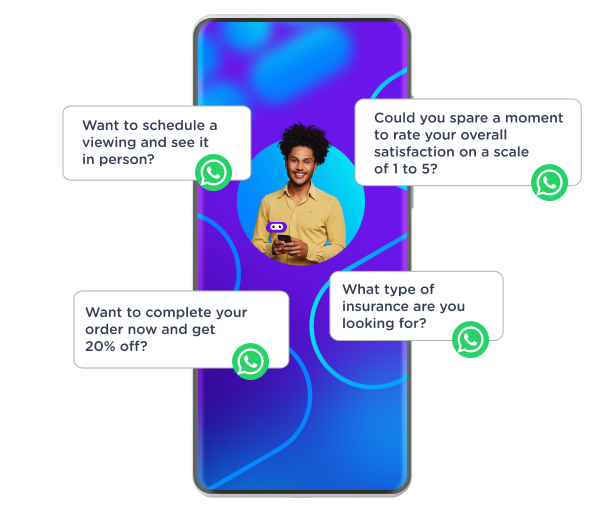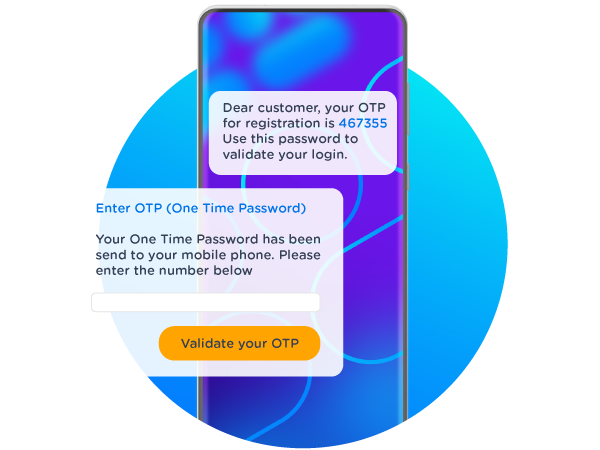- WhatsApp vs SMS: Overview
- What is the WhatsApp Business Platform?
- What is SMS for Business?
- WhatsApp vs SMS: Engagement
- WhatsApp vs SMS: Security
- WhatsApp vs SMS: Use Cases
- Customer Support
- Notifications
- Marketing & Sales
- Authentication & OTPs
- WhatsApp vs SMS: Pricing
- WhatsApp vs SMS: Which One Suits Your Business?
Both channels have unique traits, use cases and added business value. While the launch of WhatsApp in 2009 managed to make an impact on SMS traffic, the old reliable SMS is still going strong. In this blog, we'll dive into the world of WhatsApp vs SMS and highlight the differences from a business perspective to help you make a well-advised decision for your communication strategy.
WhatsApp vs SMS: Overview
What is the WhatsApp Business Platform?
WhatsApp is one of the most popular global messaging channels, with more than 2 billion active daily users worldwide.For British users, it's the most used social messaging channel with 10m downloads each year. In Europe, WhatsApp is in the top three most popular messaging channels. And its popularity doesn't dwindle across generations. Boomers (55+) and Gen X (45-54) both crown the messaging app as the most popular, and it has a place in the top three of both Millennials (25-44) and Gen Z (18-24).
WhatsApp offers users cross-platform conversational-style messaging and can be accessed on any device with an internet connection, including desktops, laptops, tablets, and phones. Its messages have rich media features, allowing users to share text, images, and video messages in two-way communication with a 4096-character limit per message and are available in 60 different languages in over 180 countries.
With this, it’s no surprise that Meta offers a solution for businesses to harness the power of this messaging platform: WhatsApp Business Platform. WhatsApp Business Platform is available through API or software, depending on your business needs. In fact, you even have the choice between an On-Premise API or a Cloud API. Both APIs can be easily accessed via a WhatsApp Business Solution Provider (BSP) like CM.com.
TL;DR WhatsApp Business Platform
Global reach (180 countries), 2 billion active daily users
30 million UK users and 10m downloads each year
Cross-platform messaging service with rich media features
4096 character limit per message
Two-way communication in 60 languages
Internet access required
Available through API and Software
Conversational UI
What is SMS for Business?
SMS, or Short Message Service, is one of the oldest messaging services. Launched in the 1980s, SMS allows users to send and receive (short) text messages (two-way communication) on mobile phones. There are no specific requirements needed for SMS. A valid phone number and a mobile contract to send and receive messages is enough. Every mobile phone has a native SMS app built in, which means that receiving SMS messages is already hard-wired into all mobile devices worldwide. With 5.1 billion mobile service users around the world (67% of the global population), and 111.8 million in the UK, SMS has become a powerful tool to reach your audience.
Since the rise of instant messaging apps, SMS has experienced an impact on its traffic. Contrary to the newer apps with their rich features, SMS is quite basic in its communication. Plain text messages, without fluff, and a character limit of 160. But, that hasn't impacted the channel's engagement with Click-Through Rates (CTR) 9.18% higher compared to other digital channels.
SMS can be set up and sent in minutes with CM.com, and it's never been easier. It is available for business communication via API or cloud software, depending on your company's needs.
TL;DR SMS
Hard-wired on all mobile devices (no additional requirements)
Global reach, 5.1 billion users (67% of the world population)
111.8 million mobile users in the UK
Mobile contract required
No rich media and 160 character limit
CTR 9.18% higher compared to other digital channels
Two-way communication
Available through API and software
Now you know the core strengths and features of both channels, we can compare them for (high-volume) business use. WhatsApp Business Platform vs SMS for Business.
WhatsApp vs SMS: Engagement
Though both channels allow two-way communication and are technically conversational in nature, WhatsApp is the more conversationalof the two. While SMS has the option of two-way messaging, it is more often used as a one-way street.
WhatsApp tends to create a more personal and informal customer engagement than SMS. This in turn will help build customer relationships and trust, leading to a boost in customer satisfaction rates and brand loyalty. The caveat, however, is that not everybody uses WhatsApp (or has reliable internet access), so there is a (small) chance that you won't reach your entire audience. SMS has the added benefit of being a native app on almost all phones, making it a great tool to reach the vast majority of your audience, even the ones without reliable internet access.
WhatsApp is great for having a conversation with your customers, but SMS is also very capable of doing just that. Likewise, SMS is known to be a big asset for outputting information in bulk. These are all important to keep in mind when you wish to engage your customers. But overall, both channels can be your ally, and it really comes down to your personal goals and audience preferences.
WhatsApp vs SMS: Security
Scammers are unfortunately a threat that we all need to keep in mind when communicating with customers. You don't want your loyal customers to fall victim to criminals who message them impersonating your business or abusing your services.
WhatsApp messages are end-to-end encrypted, meaning that the messages are encrypted before being sent. Only the recipient can read the messages, making it hard for scammers to access the contents. SMS messages are unfortunately not encrypted, which poses a risk of interception if you don't take additional security measures.
WhatsApp Business Platform users can also claim authenticity by verifying their business accounts. This will help your customers identify between your business and possible scammers.
WhatsApp vs SMS: Use Cases
Customer Support
WhatsApp's informal and conversational nature makes it a great tool for customer support. Enable your customers to engage with your business via the WhatsApp Business Platform and let them ask questions and share problems within an interface they are already familiar with. You can even let a chatbot answer commonly asked questions to automate and streamline your customer support.
Notifications
Sending time-sensitive notifications such as tracking and order updates can be done via WhatsApp, but SMS will excel at keeping your customers up-to-date and notified. Whereas WhatsApp notifications are limited to device owners with a WhatsApp account (and internet accessibility), SMS notifications will get delivered to any mobile phone with a service plan. Ultimately, sending WhatsApp notifications will often require a fallback messaging option (SMS) if the customer is not active on WhatsApp.

Marketing & Sales
Sending your customers the latest deals and offers via promotional messages can be easily done via WhatsApp. The platform is more personal, and the rich media and product messages feature can truly enhance the offers you send out to your audience. The conversational nature of WhatsApp lends itself perfectly to Conversational Commerce, and even assisted sales. It's a great channel for stimulating engagement with your customers, but there's a catch - your customers need to have WhatsApp installed.
SMS can similarly be used to send promotional messages, with an impressive open rate of 98%. Though SMS may lack the rich media that WhatsApp has incorporated into its platform, it has the benefits of its incredible reach. Also, SMS can make up for its lack of rich features with a link to a landing page with for example marketing offers.
Authentication & OTPs
When it comes to security, there is one important use case both channels can assist with: Multi-Factor Authentication. Even devices without a stable internet connection are capable of receiving SMS messages, making SMS a very reliable choice for sending One Time Passwords (OTPs).
WhatsApp messages, including WhatsApp OTPs, are encrypted from end to end, making it one of the safest options available. It's no surprise that WhatsApp Business is also a popular choice for sending OTPs.

WhatsApp vs SMS: Pricing
First off, the way both platforms price their services is vastly different: SMS pricing is often related to volume (per SMS or bundled prices), while WhatsApp pricing is conversation-based, with different rates for different conversation types. These pricing systems relate to the way these platforms focus on customer engagement: conversations via WhatsApp Business Platform vs bulk output via SMS.
Generally speaking, SMS is a tad more expensive, because you need to acquire a business number from an SMS provider (like CM.com). Sure, some number types are free, but as a business, you will probably prefer a short code number. They just look way more professional and trustworthy. After purchasing a number, SMS providers will charge a fee per SMS or per bundle of messages, and will often offer volume discounts.
WhatsApp Business Platform charges per conversation, and applies different rates based on conversation type and on who initiated the conversation. Customer-initiated and Utility conversations (support and OTPs) are generally cheaper than messages that your business initiates (like marketing messages). The good news though, each WhatsApp Business Account receives 1,000 free service or customer-initiated conversations per month.
WhatsApp vs SMS: Which One Suits Your Business?
Whether WhatsApp Business Platform or SMS suits your business best, highly depends on your goals, your audience, and the data you have available. WhatsApp Business Platform is a more conversational-based channel with higher engagement rates, ideal for conversing with your customers and building customer relationships and trust. It does however require that your customers have WhatsApp installed.
SMS is often seen as one-way communication, even though it also allows customers to converse with you. The true strength of SMS lies in its reach. The fact that it's native on most mobile phones makes it a powerful tool to reach your audience, regardless of internet connection or downloaded apps.
And this doesn't even need to be a choice. WhatsApp Business Platform and SMS for Business complement each other greatly. Engage customers over WhatsApp and fall back to SMS for the audiences that don't use WhatsApp.
Check out CM.com's WhatsApp Business Platform and SMS solutions below, and feel free to reach out to one of our experts to discuss the possibilities for your business.
